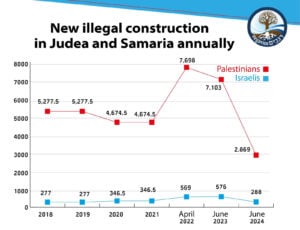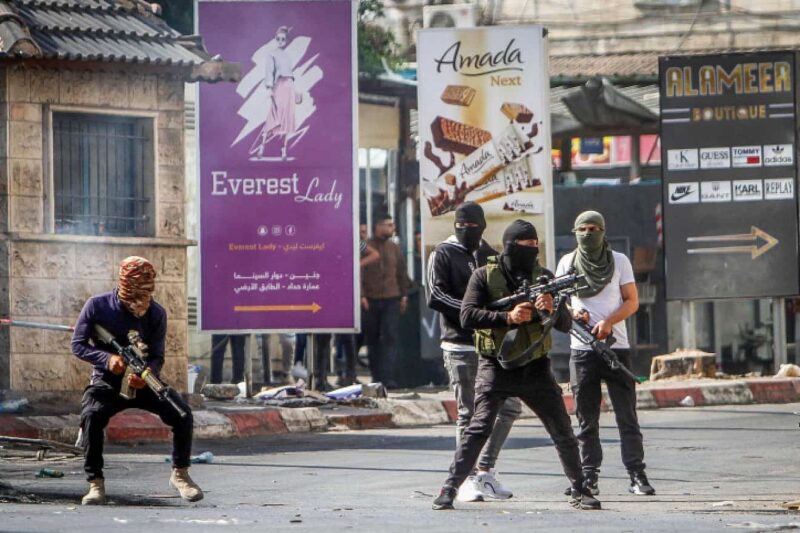ARTICLE AD BOX
Illegal Palestinian construction ‘deterred’ by sharp increase in enforcement actions against unauthorized buildings in Judea and Samaria, report finds.
By World Israel News Staff
The number of new illegal Palestinian Arab building starts in Judea and Samaria is down sharply this year, according to a new report, following a period of increased enforcement efforts against unauthorized construction.
On Wednesday, the watchdog group Regavim released a report which found a significant decline in the number of new illegal construction starts in Judea and Samaria, and the number of new illegal buildings in the area.
For the report, Regavim’s Research Division analyzed aerial surveys of Judea and Samaria, comparing May 2024 to June 2023 images.
The study found that there was a significant decrease in the number of new illegal structures completed in 2024, with a monthly average of 260 buildings completed during the last survey period, down from 608 new completed buildings per month in 2023 and 547 in 2022, marking a drastic reduction compared to the previous five years.
Under the Bennett-Lapid government, with Benny Gantz as Defense Minister, illegal construction in the Arab sector in Judea and Samaria reached an all-time high, with an average of 642 new buildings completed per month in mid-2022, which represents 234% more in comparison to the rate in this new study’s time-period.
In 2023, the first year of the current government’s administration in which preservation of state land was prioritized, the upward trend established under the previous government continued, with an average of 608 structures per month.
However, the latest measurements indicate a reversal of this trend in the first half of 2024.
The authors of the report said the decline was likely not to due to the ongoing war with Hamas, and suggested instead that increased enforcement activity against illegal Arab construction was influencing the decline.
In the first 10 months of 2024, the report noted, the Civil Administration demolished 602 illegal Arab-built structures in Area C, compared to only 306 in all of 2023.
The Civil Administration is also more likely now to demolish larger, permanent buildings, with a number of multi-story villas dismantled this year near the Tekoa-Jerusalem road in Eastern Gush Etzion, along with another three villas in northern Samaria, and a large building opposite Efrat.
“These high-profile demolitions served as a deterrent, signaling to the Palestinian Authority and its international supporters that Israel now views illegal construction as a strategic security threat,” said Naomi Kahn, Director of Regavim’s International Division.
“This contrasts with previous years, when demolitions focused on warehouses, fences, and minor structures. This change in policy, long advocated by Regavim, has been increasingly supported by Israeli legislators since the October 7th attack, which was facilitated by similar dual-use illegal structures near the Gaza border.”
Although this year’s figures show a decrease in the pace of land takeovers, the long-term trend continues to rise.
The Palestinian Authority has now constructed 97,581 illegal structures in Area C of Judea and Samaria, an area fully governed by Israeli civil and security forces.
Aerial imagery clearly shows that the Palestinian Authority has chosen to prioritize building, agricultural, and infrastructure projects in Area C instead of developing Areas A and B, aligning with the 2009 Fayyad Plan’s aim to establish a Palestinian state across all of Judea and Samaria.
Regavim has noted that aerial images show minimal new construction in PA-controlled areas, with intensive building near major roads in Area C posing security threats by isolating Israeli settlements and linking PA villages to strategic highways.
Construction in the seam-line buffer zone continues unabated, while illegal Israeli structures in Area C have decreased by 50% over the past year, totaling 5,654, with 85% of them within recognized Israeli community boundaries.
“This is a refreshing shift in the battle for land”, says Meir Deutsch, Regavim Director.
“While the State of Palestine is being established de facto through construction and infrastructure, the Israeli government is finally responding to voter mandates by addressing these developments. We hope to see this trend continue and even intensify.”
Illegal Arab constructionillegal Palestinian constructionJudea and SamariaRegavim

 2 weeks ago
35
2 weeks ago
35










 English (US) ·
English (US) ·